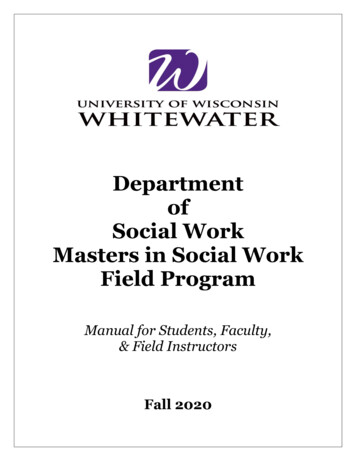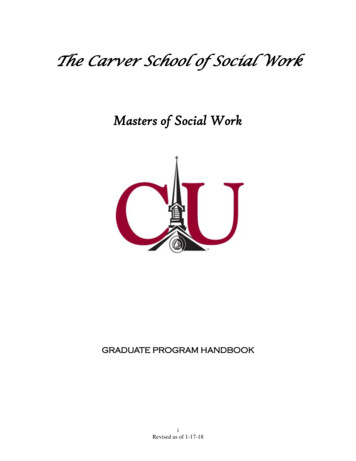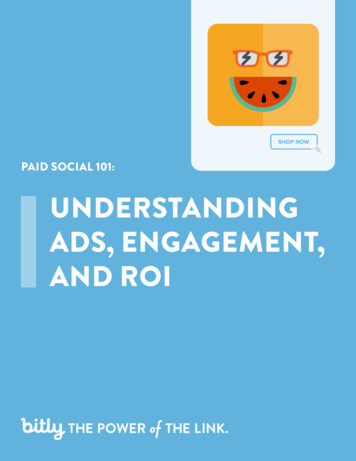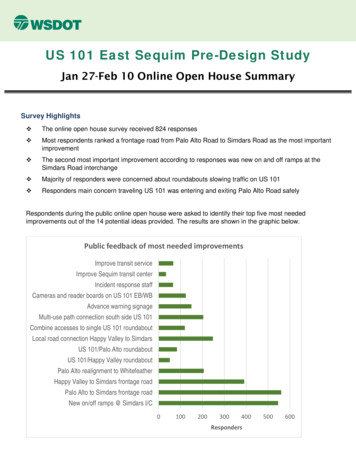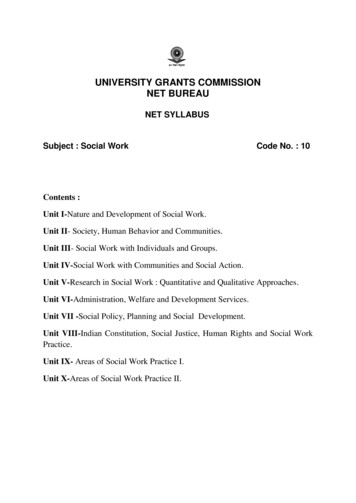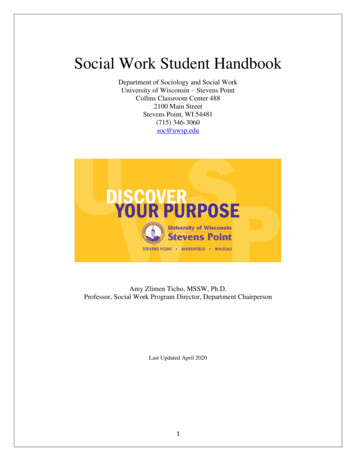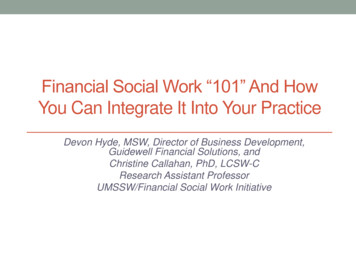
Transcription
Financial Social Work “101” And HowYou Can Integrate It Into Your PracticeDevon Hyde, MSW, Director of Business Development,Guidewell Financial Solutions, andChristine Callahan, PhD, LCSW-CResearch Assistant ProfessorUMSSW/Financial Social Work Initiative
Learning Objectives for Workshop 1) Get an overview of financial social work and how it isemerging today in social work practice 2) Learn more about the basics of financial issues andhow they impact clients’ lives 3) Learn how to integrate financial social work conceptsinto practice and to have a practice that is especiallysensitive to clients’ financial and psychosocial needs
FSWIWhy Financial Social Work? Economic Recession impacted individuals & families across ALL income levels35% of MD residents lack sufficient savings, 55% usesubprime creditFinances are integrally related to individual, family andcommunity wellbeingPerson-in-Environment needs to include financialApplication to diverse social service settings andpopulations Financial capability attitude, knowledge, skills, and self-efficacy neededto make money management decisions that best fit the circumstances ofone's life Need enabling environment that includes, but is not limited to, access to appropriatefinancial services. (Center for Financial Inclusion definition)
Why Financial Social Work?Need to: Integrate financial and psychosocial aspects of counseling Recognize that a host of problems contribute to financial& emotional distress/devastation (life-threatening illness,aging at times, interpersonal violence, foreclosure, jobloss) Address problems in a comprehensive, holistic way Recognize that financial and emotional stress are closelyintertwined Identify social workers/counselors to be skilledin/comfortable with these areas with assessment andintervention
Why Financial Social Work? Development of interventions that address financial andpsychosocial realities Development of new surveys measuring financial realities,capability, knowledge, self-efficacy Addressing poverty and income inequalities throughpolicy and legislation Establishing partnerships among schools, agencies,practitioners, macro social workers, and others
Financial Social Work Considerations Social work practice with vulnerable individuals withcomplex needs, e.g., older adults, foster youth aging outof system, those previously incarcerated, those dealingwith life-threatening illness, those dealing with intimatepartner violence Social work practice with individuals and families who aretrying to improve their financial situations and find greaterstability Ethical requirement to understand, assess, and addresswith our clients the totality of their psychosocial, financial,and environmental realities What is financial capability?
Social workers financial planners? Social workers currently help clients create budgets,manage benefits, and sometimes manage their finances(Ex: representative payees through Social Security). Social workers can help clients work through thepsychosocial side of financial management. Social workers help clients often within the larger contextof a psychosocial stressor(s). Social workers should not give financial advice,investment tips, or provide referrals to brokers (unlessthey are certified as well).
Financial capability is According to Margaret Sherraden Combines a person’s ability to act with theiropportunity to act More than financial education Must have access to financial products and servicesthat allow them to act in their best financial interest Leads to improved financial well-being and life chances
Application to Micro Social Work Clinical activities (counseling, coaching, therapy, resource linkage, and so forth) but so much moreCross-cultural considerationsOur social work valuesChallenge of finite resourcesResponsive practiceTheoretical approaches to guide
Clients’ assessment What to consider: Does monthly income cover ongoing expenses? Is income stable every 2 weeks or month? Are they receiving any public benefits? Are they eligible for any public benefits that theyare not receiving? Is there an impact on working ability?
Client interview Create a supportive environment. Understand what the client has gone through or is goingthrough before he/she got to you. Take time to fully understand the issues at hand beforegetting straight to the solution Utilize “active listening” skills. Keep questions open-ended and probe as needed todelve into specific statements.
Theoretical Approaches that GuideCounseling Techniques Strengths-based Crisis intervention Brief, solution-focused Supportive Psychodynamic Cognitive-behavioral Grief Resource linkage Financial coaching
Interventions Supportive, strengths-based Family systems Crisis MI Grief/loss Advocacy Consultation Resource and peer linkage
SOCIO-ECONOMIC EMPOWERMENTASSESSMENT (Hawkins & Kim, 2011) What happens to money when you get it? Do you think you are managing your money well? In the past, what have you done with money you received? How does having money make you feel? How do you reward yourself? What are some of your memories about having money whenyou were growing up? Growing up, who in your household was in charge of money? What friends or family members have helped you with money?
SOCIO-ECONOMIC EMPOWERMENTASSESSMENT (Hawkins & Kim, 2011) Have friends or family members caused you to spend money in a way that you didn’t want to?Now or within the last few months, is there anything related to moneythat is stressful for you?Is there anything you feel is not related to money that is stressful orthat you worry about?What do you think are the barriers to your not having as much moneyas you need?Are there educational barriers to stop you from being financiallysecure?Do you think you will be able to make enough money to survive in thefuture?
Bean Game Groups of 2-3 people Think of your group as a family Together as a family, decide how you want to spend yourbeans Each item has a set number of squares which indicateshow many beans are needed to ‘pay’ for that item Move beans around until family is in agreement
Bean Game Discussion Easiest decision? Most difficult? If you had played on your own, would you have spent thebeans differently? How did values, goals, and past experiences of eachgroup member affect your choices? How did the negotiation process change after your budgetgot slashed?
Exploring your financial values Why do my financial values matter if I’m counselingsomeone else? How does my own financial history impact my decisions? How can I help someone else with their finances if myown finances are not perfect? I don’t have enough money to manage, so why do myfinancial values matter?
Big questions What Is Really Important to You? What Do You Want Out of Life? What Do You Want From Your Money?
Exploring your client’s financial values I can’t save because Every time I have money My family is broke and I’ll always be broke. My money is my family’s money. I don’t know how to manage my money. Banks don’t care about poor people like me. Banks are for rich people. People who have money are greedy. I can never be rich.
Role of social worker with client Reflecting on your own biases Asking questions without judgment Money is emotional; stay with the client where he/she is Use continuum to ask directive questions Familiarize yourself with types of financial assistanceprograms
Financial coaching Strengths-based Client-driven Work on self-identified financial goals Hear about financial coaching in action: https://www.youtube.com/watch?v fLrMaKAVKgI&t 18s
Financial education Several key areas to focus on: Understanding basic banking services. Understanding tax credits and how to file taxes. Basic budgeting/creating a spending plan; shifting if needed duringthe crisis. Understanding financial values and decision-making. Protecting yourself from identity theft. Resources: FDIC Money Smart oneysmart/index.html Your Money Your Goals (CFPB) http://www.cfpb.gov
Case management Client usually doesn’t come to organization for overallfinancial planning assistance. Often doesn’t focus enough on person-in-environment;need to look at issues holistically. Due to lack of income stability, case management is oftenfocused on crisis intervention (eviction, utility shut-off,housing, food). If contact is limited and short-term, make sure client isconnected to ongoing support on financial andpsychosocial issues.
Counseling Financial stress can cause feelings of low self-worth,depression, anxiety, shame, and hopelessness. Financial stress is a major factor in divorce, family tensionand fighting, job loss, and program/school drop-out. Depending on your role, client may need to be referred toa counselor/therapist to address mental health andemotional issues.
Information and referrals There are countless programs and resources available toclients, but they often don’t know about them, or can feelhelpless or overwhelmed. A network of information and referral programs can helpconnect clients to a wide range of programs. Alliance of Information and Referral Systems http://www.marylandairs.org/ First Call for Help (211 or 800-492-0618) http://www.uwcm.org/uwcm/2-1-1-maryland.html
Role of social worker in community Understand the unique financial barriers of community residentsReach out to existing financial institutions to engagearound financial education and low-cost, appropriateproductsUse continuum to identify complimentary program andproductsParticipate in local asset-building coalitionsIdentify policy barriers to financial security and advocatefor change
Community assessment What to look at: Poverty and asset poverty rates Median and mean household income Resources (financial and psychosocial) Employment and unemployment rates Median hourly wage Access to basic banking services Understand perception vs. reality
Programs Income supports Benefits screening and management Financial education Case management and referrals Counseling (financial and psychosocial/supportive)
Income supports Temporary CASH Assistance (TCA) Purchase of Care (POC) Head Start Unemployment Insurance Supplemental Nutrition Assistance Program (SNAP) Maryland Children’s Health Insurance Program (MCHIP) SSI/SSDI
Ethical and professional boundaries Professional boundaries Managing use of self Understanding your triggers Know when to refer Ethical boundaries Allowable practice within your relationship and expectation withclient Allowable practice within funding or organizational requirements Referrals to only services with consent of client, no economic gainsor conflict with you or your organization
Asset Building Continuum - AdultsPolicyProductsProgramEmergency ssetownershipLong-termwealthcreation Financial education Benefits screening Case management &referrals Counseling Income supports Financial education Financial coaching &credit counseling Free tax prep (VITA) Pro bono legal counsel Family Self-Sufficiency Financial education &coaching Car ownership IDAs (computers, 1stlast month rent) Entrepreneurship Financial coaching Housing counseling Investment clubs Retirement planning Small businessdevelopment Utility discounts No fee/low feechecking/savings Second chance checking State ID or driver’slicense Subsidized healthinsurance Discount prescriptions Credit builder loans Debt consolidation Loan refinance/Shortterm loans Matched Savings Accounts Auto build CDs Ways to Work vouchers Affordable car loans Financial aid for higher ed. Insurance – car, rental,property, life Down payment assistance 401(k), 403(b), IRAs College Savings Plans Insurance – car, rental,property, life Expansion of income Debt management andlimits (benefit cliffs) Expansion of asset limits Improve Check cashingregulations Employer incentives Bounce loans (overdraft)settlement protections Refund anticipationloan/payday loan reform Bankruptcy and creditcard reform Rent to own disclosures Auto insurance pricing Matched account funding Funding formicroenterprise programs Product quality protection Credit reporting standards Predatory lendingprotections Foreclosure prevention Preserving individual right Identity theft protectionInitial employmentMaryland CASH Campaign 2009Continuous employmentCareer development and mobility
(Ex: representative payees through Social Security). Social workers can help clients work through the psychosocial side of financial management. Social workers help clients often within the larger context of a psychosocial stressor(s). Social workers should not give financial advice, investment tips, or provide referrals to brokers (unless


